Flowers have long been admired for their beauty, fragrance, and symbolic meaning, but many also offer powerful benefits for the skin. Across cultures, flowers have been used in natural remedies, oils, toners, and masks, providing antioxidants, vitamins, anti-inflammatory properties, and hydration. Growing your own garden with these flowers not only enhances your outdoor space but also gives you access to fresh, chemical-free skincare ingredients.
This guide highlights six flowers that double as natural skincare ingredients, their benefits, and practical ways to incorporate them into your daily beauty routine.
1. Calendula (Calendula officinalis)
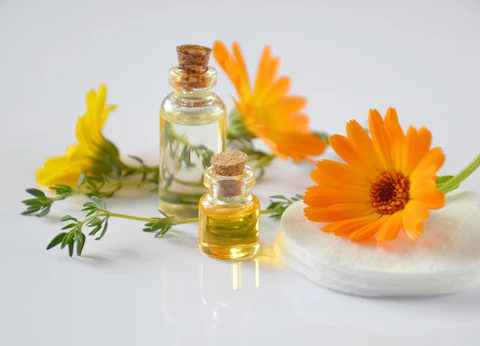
Calendula, often called pot marigold, is celebrated for its healing and soothing properties, making it ideal for sensitive or irritated skin.
Skincare Benefits:
- Anti-inflammatory and antibacterial properties help calm redness and minor wounds.
- Rich in antioxidants that protect skin from oxidative stress.
- Moisturizing effects for dry or chapped skin.
How to Use:
- Calendula Oil: Infuse petals in a carrier oil (like olive or jojoba) to create a soothing massage oil or skin balm.
- Face Masks: Blend dried petals into masks with yogurt or honey for hydration and skin repair.
- Toners: Brew petals into a gentle tea, cool, and use as a facial toner for calming effects.
Tip: Calendula petals are gentle enough for daily use on delicate skin, making it a versatile skincare flower.
2. Lavender (Lavandula angustifolia)
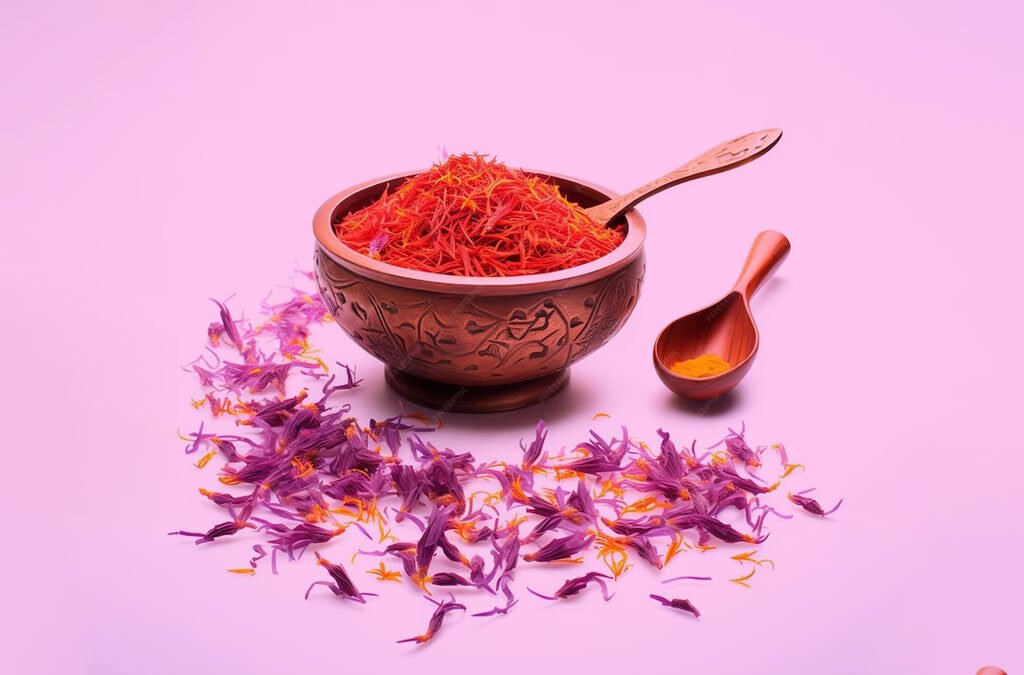
Lavender is renowned for its soothing fragrance, but its flowers also possess antimicrobial and calming properties for the skin.
Skincare Benefits:
- Reduces redness and irritation.
- Helps balance oily skin and acne-prone areas.
- Aromatherapy benefits reduce stress, which indirectly improves skin health.
How to Use:
- Lavender Water: Steam fresh flowers with water to create a gentle facial mist.
- Lavender Oil: Infuse flowers in oil for massages or add to lotions for calming effects.
- Bath Soak: Add dried lavender to bathwater to soothe inflamed or dry skin.
Tip: Combine lavender with other flowers like chamomile or rose petals for a soothing, multi-flower skincare blend.
3. Rose (Rosa spp.)
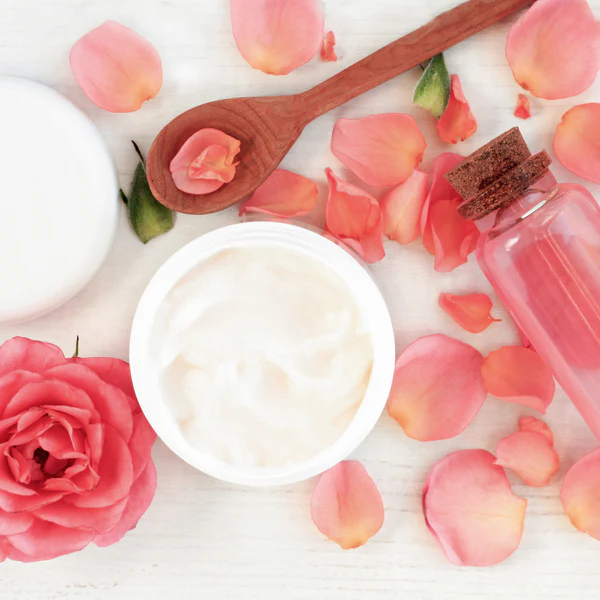
Roses are iconic not only for their beauty and fragrance but also for their hydrating and anti-aging properties.
Skincare Benefits:
- High in vitamin C, which boosts collagen production.
- Soothes redness, irritation, and sensitive skin.
- Helps maintain skin elasticity and hydration.
How to Use:
- Rose Water: Steam fresh petals and use the distilled water as a natural toner or refreshing mist.
- Face Masks: Blend petals with honey or yogurt for a hydrating mask.
- Bath Infusions: Sprinkle petals in bathwater to relax and soften skin.
Tip: Fresh petals yield the best aroma and skincare benefits, but dried petals can also be used effectively.
4. Chamomile (Matricaria chamomilla)
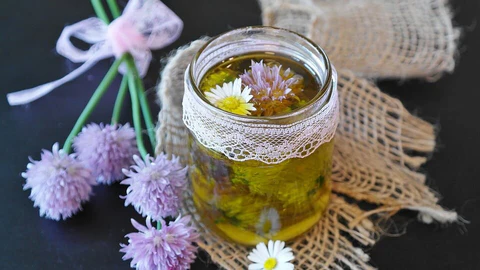
Chamomile is known for its calming effects in teas, but it is also highly beneficial for sensitive and inflamed skin.
Skincare Benefits:
- Anti-inflammatory and antioxidant properties reduce redness and irritation.
- Gentle enough for delicate or eczema-prone skin.
- Soothes minor burns, insect bites, and puffiness.
How to Use:
- Chamomile Tea Toner: Brew petals into a tea, cool, and use as a daily facial rinse.
- Compresses: Apply cooled chamomile tea bags to tired or inflamed skin.
- Face Masks: Combine chamomile infusion with oatmeal or yogurt for a calming mask.
Tip: Chamomile works well when blended with lavender or calendula for soothing multi-flower skincare treatments.
5. Hibiscus (Hibiscus sabdariffa)
Hibiscus is sometimes called the “Botox plant” due to its natural alpha-hydroxy acids (AHAs) that help exfoliate and rejuvenate the skin.
Skincare Benefits:
- Natural AHAs promote gentle exfoliation and removal of dead skin cells.
- Rich in antioxidants and vitamins for anti-aging benefits.
- Helps improve skin elasticity and tone.
How to Use:
- Hibiscus Face Mask: Grind dried petals into a powder and mix with honey, yogurt, or aloe gel for a natural exfoliating mask.
- Hibiscus Tea Toner: Brew petals to create a nutrient-rich facial rinse.
- Body Scrubs: Combine hibiscus powder with sugar and oil for an exfoliating body scrub.
Tip: Hibiscus works best for aging or dull skin, offering natural rejuvenation and glow.
6. Marigold (Tagetes spp.)
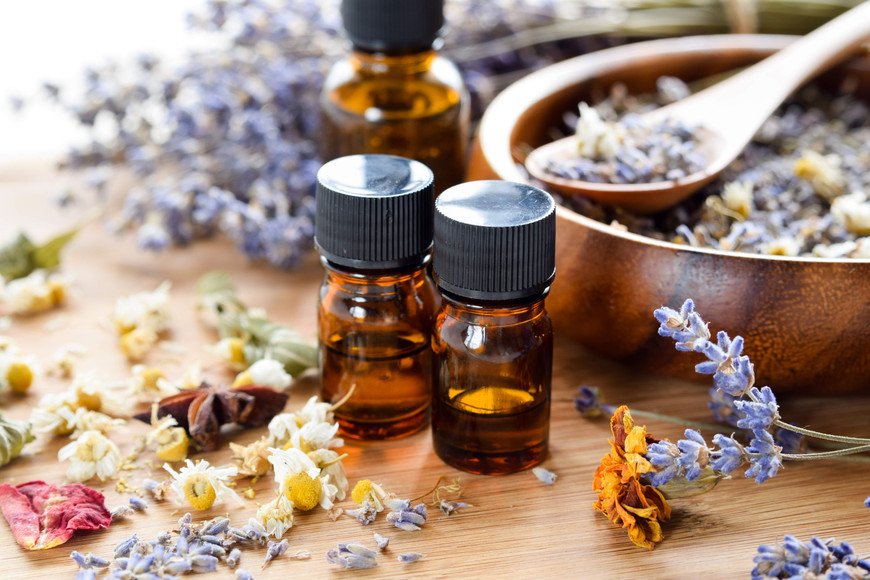
While similar to calendula, marigolds have slightly different properties, offering antiseptic and skin-soothing qualities.
Skincare Benefits:
- Antibacterial and antifungal properties help combat minor skin infections.
- Anti-inflammatory compounds soothe irritated or sunburned skin.
- Brightens complexion and improves overall skin texture.
How to Use:
- Infused Oil: Soak marigold petals in carrier oil for use as a massage or healing oil.
- Bath Additive: Sprinkle dried petals in bathwater to calm skin.
- Face Masks: Blend petals with honey or aloe for skin repair and hydration.
Tip: Use a combination of marigold and calendula for maximum soothing and healing effects.
Practical Tips for Using Flowers in Skincare
- Choose Organic or Pesticide-Free Flowers: Only use flowers safe for topical application.
- Harvest Properly: Pick flowers in the morning when essential oils are at their peak.
- Storage: Dry flowers in a cool, dark, and well-ventilated space to preserve potency.
- Patch Test: Always test new flower-based skincare products on a small skin area.
- Combine Wisely: Blend flowers with natural carriers like honey, yogurt, aloe, or oils for best results.
- DIY Skincare Blends: Create facial mists, masks, scrubs, or bath soaks for multi-purpose skincare treatments.
Benefits of Using Flowers in Skincare
- Natural Ingredients: Free from harsh chemicals, parabens, and synthetic fragrances.
- Antioxidants: Many flowers protect against free radicals and environmental damage.
- Anti-Inflammatory Properties: Reduce redness, irritation, and swelling.
- Hydration and Moisturization: Flowers like rose and chamomile hydrate skin naturally.
- Aromatherapy: Pleasant fragrances reduce stress and enhance well-being, indirectly improving skin health.
DIY Skincare Ideas Using Flowers
- Calming Chamomile & Lavender Facial Mist: Brew chamomile and lavender together, cool, and spray onto face for daily hydration.
- Rose & Hibiscus Anti-Aging Mask: Blend rose petals and hibiscus powder with honey to nourish, exfoliate, and brighten skin.
- Calendula & Marigold Healing Oil: Infuse petals in olive or jojoba oil for a natural moisturizer and skin healer.
- Mint & Chamomile Soothing Bath: Combine fresh mint leaves and chamomile petals in a muslin bag and steep in warm bathwater for calming effects.
Conclusion
Incorporating flowers like calendula, lavender, rose, chamomile, hibiscus, and marigold into your skincare routine allows you to harness the natural power of plants for healthier, glowing skin. These flowers are not only beautiful in your garden but also versatile in DIY skincare applications, providing hydration, soothing properties, and antioxidants without the harsh chemicals found in many commercial products.
Growing your own flower garden ensures fresh, chemical-free ingredients are always available, and combining flowers into creams, masks, toners, or bath soaks allows you to create personalized skincare products tailored to your skin type.
With careful harvesting, drying, and infusion, these six flowers can transform your daily skincare routine into a luxurious, natural, and sustainable ritual, proving that beauty truly starts with nature.
Tip: Experiment with flower combinations for customized blends, and always enjoy the sensory benefits of fragrance and color along with the skin-healing properties.

Leave A Comment